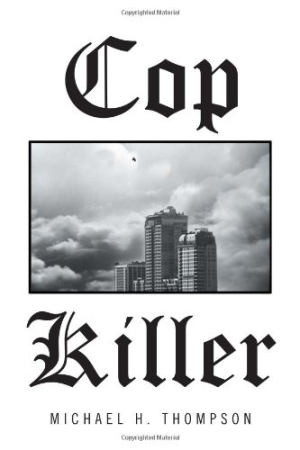Cop Killer
As its title suggests, Michael H. Thompson’s debut novel, Cop Killer, packs a wallop. Set in present-day Portland, this slim novella of sixty-four pages is harrowing in its methodical, emotionless description of one man’s revenge. Through Thompson’s spare, almost journalistic telling, the mind of a killer with no doubts about his rectitude is depicted with unflinching, unapologetic candor.
When former Army Ranger Gabe loses his aging, alcoholic father to a bad case of delirium tremens coupled with neglect, he sets out to exact retribution. Gabe’s brand of justice is Draconian: he plots to kill nearly a dozen police officers who were present when his father died. “There will be blood for what happened, vindicated, remorseful blood,” he vows. The text continues, “Forget…the law. The law has already failed in letting his father die.”
It may be that the true driver of Gabe’s payback is rage against his once-brilliant father’s ignoble end and not the attendant cops. “Who do they think they were killing!” he asks, as if the greatness of the fallen makes the neglect any more reprehensible. Whatever its source, Gabe’s rage stands in for grief, and then both are diverted into the execution of his plan.
What is so unsettling about Thompson’s depiction of Gabe is that the character’s mission is not one of obsession. Readers can relate to obsession—an amplified and very human emotional state that makes people do silly things. Gabe’s intricate plotting is done with clear eyes: he believes that his perception of truth is absolute, when history teaches us that this is never the case.
Thompson has created a powerful, timely work, but its message could be clearer. From Icelandic gunman Breivik to the Mansons, killers often believe they are exacting justice of a sort. Gabe believes he is doing what is right with his killings, and at times readers may be tempted to sympathize with him. Yet we live in a country where shooters regularly enter schools and theaters spraying bullets, and we find, when we examine their letters and diaries later, that they also believed they had good reasons to act as they did. Thompson’s book poses startling questions about how people perceive right and wrong, but seems to offer the answer that Gabe is, well, a necessary force to maintain the upright behavior of police.
Further, the text needs another round of rigorous editing to excise misspellings, punctuation snafus, and general grammar problems. Indeed, more than once the tense shifts distractingly.
This book is for a mature reader with a defined sense of right and wrong. It provides an unusual glimpse into a killer’s head but offers few answers as to the relationship between an individual’s sense of justice and that of society’s.
Reviewed by
Leia Menlove
Disclosure: This article is not an endorsement, but a review. The publisher of this book provided free copies of the book and paid a small fee to have their book reviewed by a professional reviewer. Foreword Reviews and Clarion Reviews make no guarantee that the publisher will receive a positive review. Foreword Magazine, Inc. is disclosing this in accordance with the Federal Trade Commission’s 16 CFR, Part 255.

